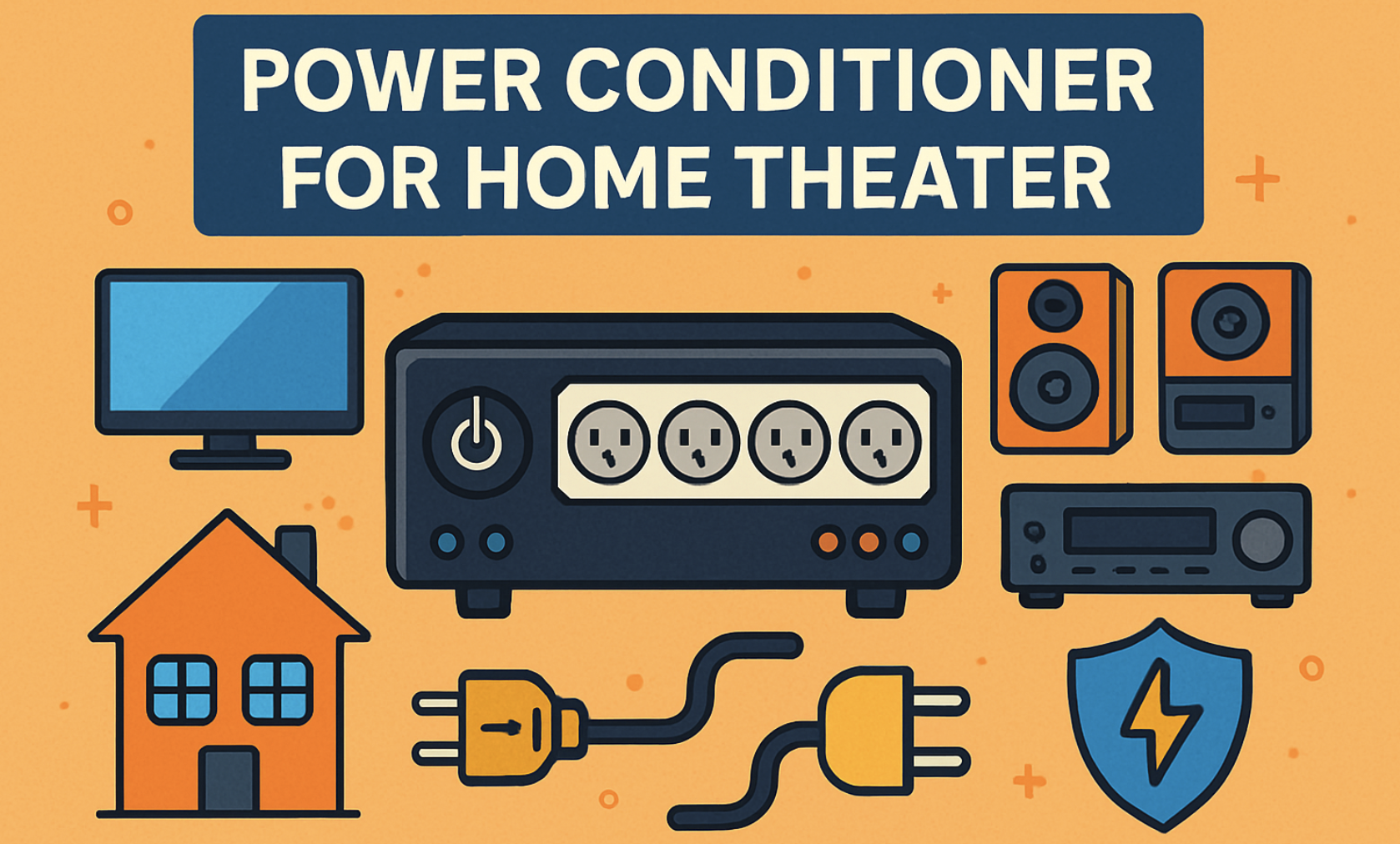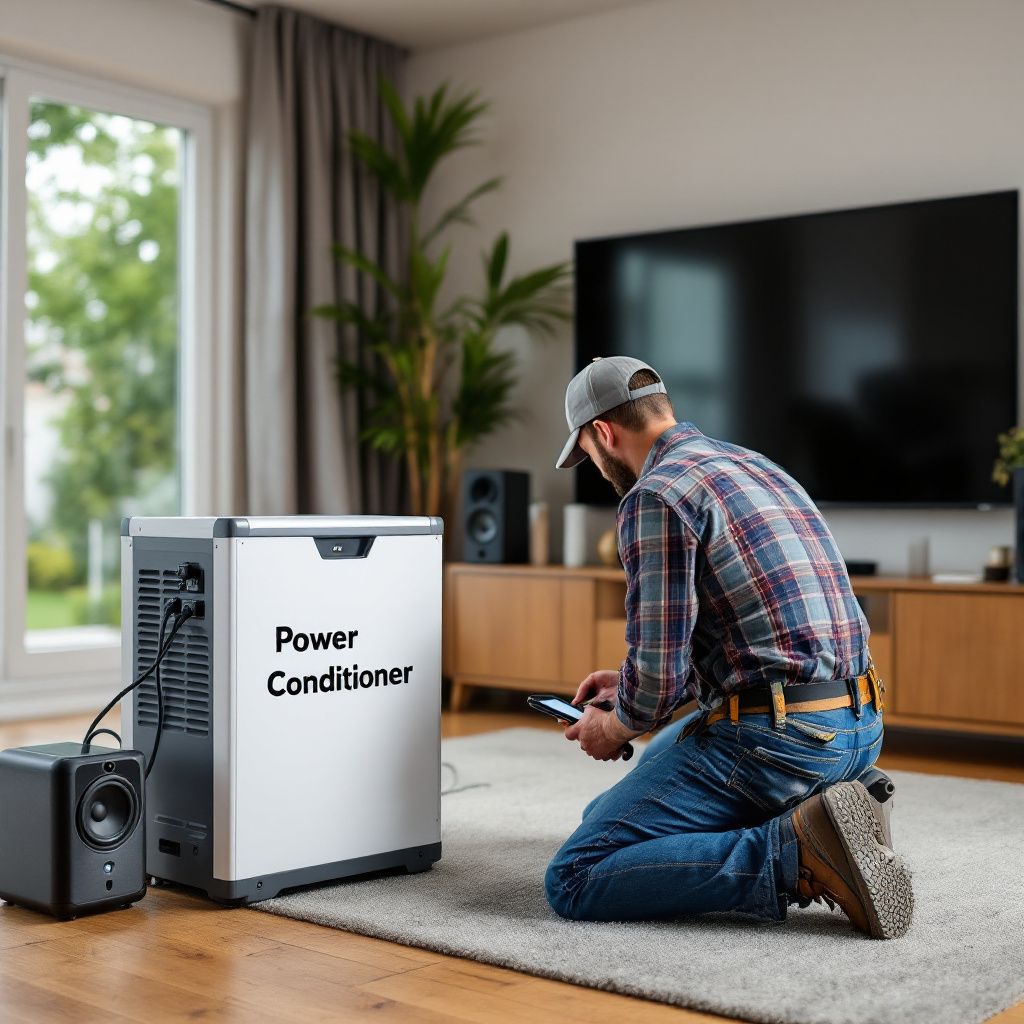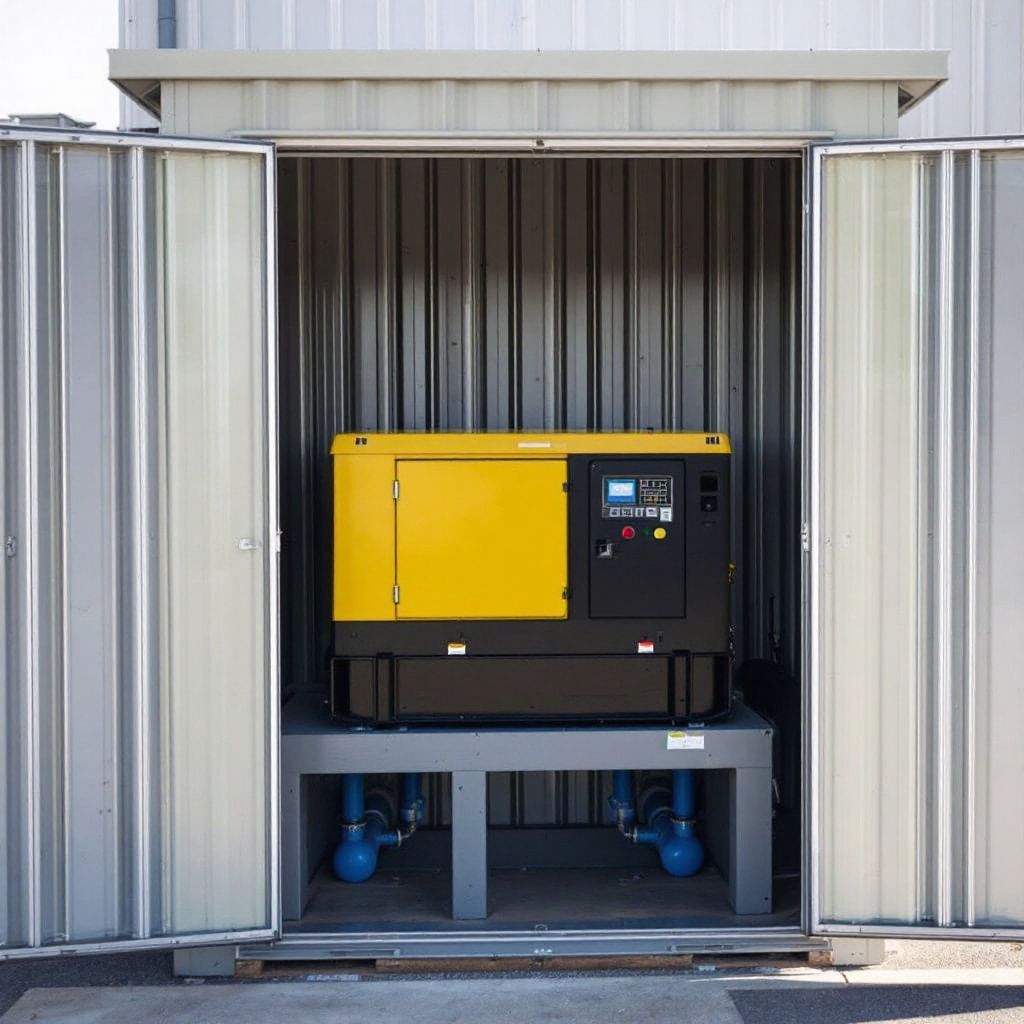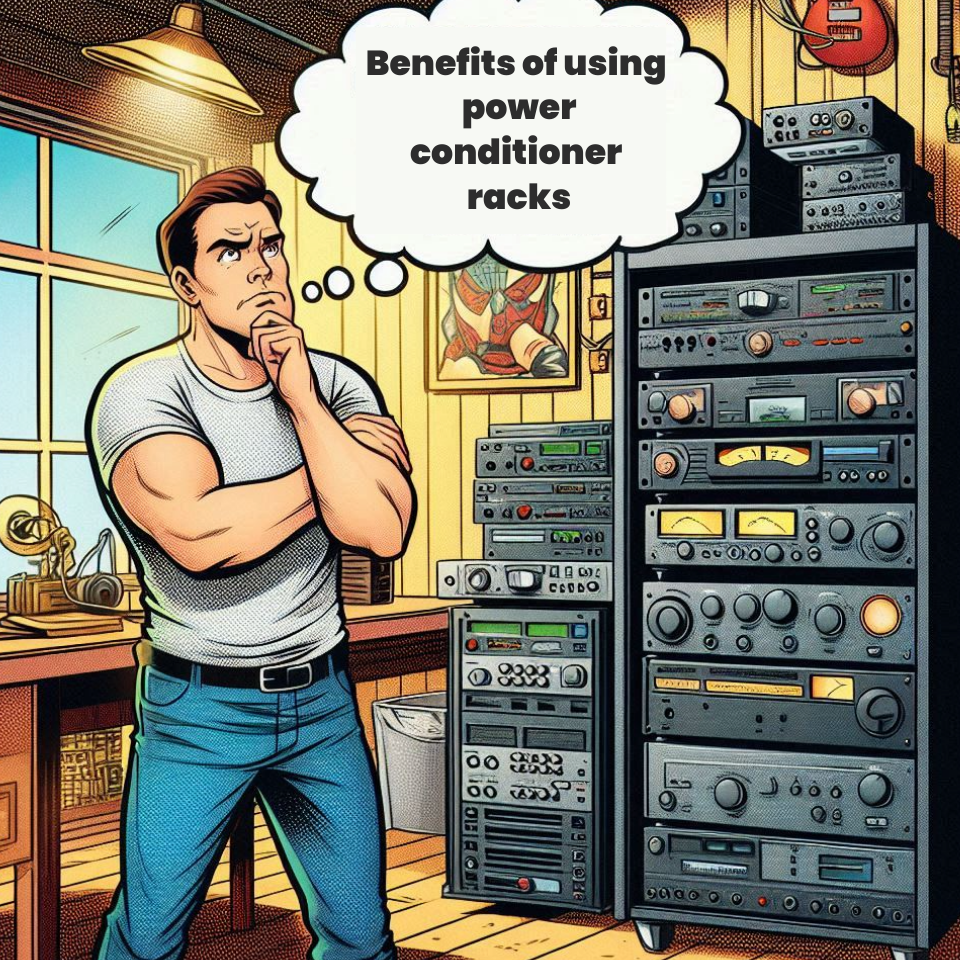
Most homeowners are not aware that power quality issues can significantly impact their home theater experience. Problems like dirty power, which includes voltage spikes and high-frequency noise, often disrupt sensitive home theater equipment. Appliances such as refrigerators or microwaves may introduce electrical noise, which can affect the performance of your system. You might also notice low-level hums or pops in your speakers, caused by mode noise from devices sharing the same circuit.
A power conditioner for home theater helps address these challenges. It stabilizes power, reduces interference, and protects your equipment from surges. This ensures your home theater equipment operates at its best, delivering clear sound and sharp visuals. If you reside in a region with unreliable power or possess a premium system, a power conditioner can significantly enhance performance.
What Is a Power Conditioner for Home Theater?
Definition and Purpose
A power conditioner for home theater is a device that regulates the electricity flowing to your audio-visual equipment. It ensures a stable power supply by filtering out electrical noise and protecting your devices from power surges. Often referred to as a line conditioner or power manager, it acts as a safeguard between your home theater system and the power source.
This device not only improves the quality of electricity but also extends the lifespan of your equipment by preventing damage caused by voltage fluctuations or electromagnetic interference (EMI).
The primary purposes of a power conditioner include:
-
Protecting electronics from power surges and spikes.
-
Delivering clean energy to enhance audio and video performance.
-
Reducing noise distortions for clearer sound.
-
Increasing the overall efficiency of your home theater system.
|
Purpose |
Description |
|---|---|
|
Protect from power surges |
Shields equipment from electrical surges that can cause damage. |
|
Reduce noise distortions |
Minimizes unwanted noise that can affect audio quality. |
|
Increase max volume |
Enhances the sound output of audio equipment. |
|
Prolong equipment lifespan |
Prevents damage from electrical irregularities. |
How Power Conditioners Work
Power conditioners stabilize voltage and filter out electrical noise to ensure your home theater system performs at its best. They use components like capacitors and inductors to create a band-pass filter tuned to 60Hz, which allows only the desired frequency to pass through while blocking others. This process eliminates interference caused by other devices on the same circuit.
Some models also isolate receptacles, preventing noise from one device from affecting others.
Additionally, power conditioners monitor line voltage to maintain a consistent and clean waveform. This ensures your equipment receives a steady flow of electricity, reducing the risk of damage and improving overall performance.
Key Features to Look For
When selecting a power conditioner for your home theater, prioritize features that match your system’s specific needs. Here are some essential power conditioner features to consider:
-
Number of Outlets: Ensure the device has enough sockets for all your components, with a few extras for future additions.
-
Surge Protection: Look for a high joule rating to protect against electrical damage.
-
Voltage Rating: Choose a model that matches your system’s requirements, typically 120V or 240V.
-
Automatic Voltage Monitoring (AVM): This feature continuously monitors voltage levels to prevent fluctuations.
-
Wattage Capacity: Opt for a conditioner with a wattage rating of around 1,800 watts for optimal performance.
|
Feature |
Importance |
|---|---|
|
Number of sockets |
Accommodates all devices in your home theater system. |
|
Surge protection |
Shields equipment from sudden electrical spikes. |
|
Voltage rating |
Ensures compatibility with your system’s power requirements. |
|
Automatic Voltage Monitoring |
Maintains stable voltage levels for consistent performance. |
|
Wattage capacity |
Supports the power needs of multiple devices. |
By understanding these features, you can select a power conditioner that enhances your home theater experience while protecting your valuable equipment.
Benefits of Using the Best Power Conditioners for Home Theater
Improved Sound Quality
A power conditioner for home theater can significantly enhance your audio experience. It filters out electrical noise and stabilizes voltage, ensuring your equipment receives clean power. This process eliminates distortions that often interfere with sound clarity. For example, power conditioners use filter capacitors to block high-frequency noise while allowing the essential 60Hz power to pass through. This results in a cleaner waveform, which is crucial for maintaining audio fidelity.
Users often report noticeable improvements in sound quality after using power conditioners. The difference can vary depending on your home wiring and the sensitivity of your equipment.
However, consistent voltage and reduced interference generally lead to richer, more detailed audio. Whether you’re watching a movie or listening to music, you’ll likely hear clearer dialogue, deeper bass, and more precise sound effects.
Enhanced Video Clarity
Power conditioners don’t just improve sound; they also enhance video performance. Electrical noise and voltage fluctuations can cause visual artifacts like flickering, color distortion, or reduced sharpness on your screen. A power conditioner eliminates these issues by delivering stable power to your video equipment.
With clean and consistent electricity, your display can perform at its best. Colors appear more vibrant, contrast improves, and motion becomes smoother. This is especially important for high-definition or 4K systems, where even minor disruptions can affect picture quality. If you’re aiming for a cinematic experience at home, a power conditioner ensures your visuals remain crisp and immersive.
Protection Against Power Surges and Spikes
Surges and voltage spikes pose a significant risk to your home theater equipment. These sudden increases in electrical current can damage sensitive components, leading to costly repairs or replacements. A power conditioner for home theater provides essential protection by acting as a barrier between your equipment and unstable power sources.
Most power conditioners feature high joule surge protection to absorb excess energy and safeguard devices. Automatic voltage monitoring prevents fluctuations, further reducing damage risks. Using a power conditioner gives you peace of mind, knowing your investment is safe from electrical issues.
Reduced Electrical Noise and Interference
Electrical noise can disrupt your home theater system, causing static, hums, or other unwanted sounds. This interference often comes from household appliances, fluorescent lights, or even nearby electronic devices. Power conditioners play a crucial role in eliminating these disturbances, ensuring your audio and video equipment performs without distractions.
Power conditioners filter out high-frequency noise and electromagnetic interference (EMI). They use advanced circuitry to block unwanted signals while allowing clean power to flow to your devices. This process ensures your speakers deliver crisp sound and your display produces clear visuals. You’ll notice a significant improvement in sound clarity, especially during quiet scenes in movies or music playback.
Some of the best enhance your audio experience for home theater systems also feature isolated outlets. These outlets prevent noise from one device from affecting others. For example, if your Blu-ray player generates interference, the power conditioner ensures it doesn’t impact your AV receiver or television. This isolation enhances the overall performance of your setup.
Here’s a quick comparison of how power conditioners reduce electrical noise:
|
Problem |
Solution Provided by Power Conditioners |
Benefit to Home Theater Users |
|---|---|---|
|
High-frequency noise |
Filters out unwanted signals |
Clearer sound and sharper visuals |
|
Electromagnetic interference |
Blocks EMI from nearby devices |
Reduced hums and static |
|
Device-to-device interference |
Isolates power outlets |
Improved performance for all devices |
Investing in the best power conditioners for home theater ensures your system operates in an interference-free environment. This not only enhances your viewing and listening experience but also protects your equipment from long-term damage caused by electrical noise.
Common Misconceptions About Power Conditioners
Power Conditioners vs. Surge Protectors
Many people confuse enhance your audio experience, but these devices serve different purposes. A surge protector shields your home theater equipment from sudden voltage spikes. It acts as a barrier, absorbing excess energy to prevent damage. However, it does not address issues like electrical noise or voltage fluctuations.
A power conditioner goes beyond surge protection. It stabilizes voltage, filters out electrical noise, and ensures your equipment receives clean power. This improves performance and protects sensitive components from long-term damage. If your setup already includes a surge protector, adding a power conditioner can enhance both protection and performance.
|
Feature |
Surge Protector |
Power Conditioner |
|---|---|---|
|
Primary Function |
Protects against voltage spikes |
Stabilizes voltage and reduces noise |
|
Noise Filtering |
No |
Yes |
|
Equipment Performance |
No impact |
Enhanced sound and video quality |
Are Power Conditioners Necessary for All Home Theaters?
You might wonder if every home theater setup needs a power conditioner. The answer depends on your specific circumstances. Factors like the quality of your sound system, the number of devices, and the stability of your power supply play a role.
Even if your system isn’t high-end, a power conditioner can reduce unexpected sounds and improve overall performance.
For setups without surge protection, a power conditioner with built-in surge protection offers dual benefits. It safeguards your equipment while enhancing sound and video clarity. If you experience hums or static from your audio equipment, an affordable power conditioner can resolve these issues.
Do Power Conditioners Only Benefit High-End Systems?
A common misconception is that power conditioners only benefit high-end systems. While it’s true that users with premium audio setups often report significant improvements, these devices can enhance performance in various configurations.
Clean power reduces interference, ensuring even mid-range systems deliver better sound and visuals.
High-end systems, with their delicate components, often showcase even more impressive enhancements! Users frequently share how they’ve experienced richer sound and sharper visuals after incorporating a power conditioner. But don’t worry—basic setups can also enjoy the protection and performance boost that these devices offer. Regardless of whether your system is entry-level or top-of-the-line, a power conditioner is truly a wonderful addition to your home theater!
How to Choose the Best Power Conditioner for Home Theater
Assessing Your Budget
Your budget plays a crucial role in selecting the right power conditioner. Prices for power conditioners vary widely, ranging from affordable models under $100 to premium options exceeding $500. Start by evaluating how much you’re willing to invest in protecting and enhancing your home theater system. If your setup includes high-end components, consider allocating more for a power conditioner with advanced features like automatic voltage regulation or isolated outlets.
For simpler systems, a basic model with surge protection and noise filtering may suffice.
Remember, a higher price doesn’t always guarantee better performance. Focus on finding a power conditioner that meets your specific needs without overspending. Researching user reviews and expert recommendations can help you identify reliable options within your price range.
Determining the Number of Outlets You Need
Count the devices in your home theater system to determine how many outlets your power conditioner should have. Include your TV, AV receiver, Blu-ray player, gaming console, and any additional components like streaming devices or soundbars. Add a few extra outlets for future upgrades or accessories. Most power conditioners offer between 6 and 12 outlets, so choose one that accommodates your current and future needs.
Some power conditioners also feature isolated outlets. These prevent interference between devices, ensuring optimal performance. If your system includes sensitive equipment, prioritize models with this feature. A well-planned outlet count ensures you won’t need to daisy-chain devices, which can compromise safety and performance.
Considering Voltage and Power Requirements
Understanding your system’s voltage and power needs is essential. Most home theater equipment in the U.S. operates on 120 volts, with a standard amperage of 15 or 20 amps. This translates to a maximum power capacity of 1,800 to 2,400 watts. Check the specifications of your devices to ensure compatibility with the power conditioner you choose.
Here’s a quick reference for common voltage and power requirements:
|
Outlet Type |
Voltage |
Amperage |
Maximum Power (Watts) |
|---|---|---|---|
|
Standard 120V/15A |
120V |
15A |
1800 watts |
|
Standard 120V/20A |
120V |
20A |
2400 watts |
Select a power conditioner that matches or exceeds your system’s total wattage. This ensures your devices receive adequate power without overloading the conditioner. For larger setups, consider models with higher wattage capacities to efficiently handle multiple components.
Evaluating Additional Features (e.g., Display Screens, USB Ports)
When selecting a power conditioner, additional features can significantly enhance convenience and functionality. These features enhance your home theater experience while providing practical benefits for your setup.
Display Screens
Many power conditioners include display screens that show real-time information about voltage levels, power usage, or system status. These screens help you monitor your equipment’s performance and detect potential issues. For example, if the voltage fluctuates, the display alerts you immediately, allowing you to take action before damage occurs. This feature is especially useful for high-end systems where consistent power is critical.
USB Ports
USB ports on power conditioners offer a convenient way to charge mobile devices. You can quickly connect your phone, tablet, or other gadgets without needing extra adapters. This feature is particularly helpful in home theaters where outlets are often fully occupied by AV equipment. Imagine charging your phone while watching a movie without disrupting your setup. It’s a small addition that adds significant value.
Other Useful Features
Some power conditioners include cable management systems to keep your setup organized. These systems reduce clutter by grouping cables neatly, making your home theater look cleaner and more professional. Noise reduction technology is another valuable feature. It minimizes distortions, ensuring your audio remains crisp and clear. Additionally, models with isolated outlets prevent interference between devices, improving overall performance.
Here’s a quick comparison of features and their benefits:
|
Feature |
Benefit |
|---|---|
|
Surge Protection |
Protects electronics from electrical surges |
|
Cable Management |
Organizes multiple devices in one location |
|
Noise Reduction |
Enhances audio quality by reducing distortions |
|
Improved Equipment Performance |
Increases overall performance of connected devices |
|
Clean Power Supply |
Ensures only clean energy enters devices |
When evaluating power conditioners, consider these features carefully. They not only protect your equipment but also improve your home theater’s functionality and ease of use. Investing in a model with the right features ensures a seamless and enjoyable entertainment experience.
A power conditioner for home theater can transform your entertainment experience. It improves sound clarity, enhances video quality, and provides essential protection against surges and electrical noise. These devices are especially valuable if you live in an area with unstable power or own high-end home theater equipment. When selecting a power conditioner, focus on your system’s needs. Consider factors like wattage capacity, the number of outlets, and additional features such as surge protection or noise filtering.
For most setups, a model with around 1,800 watts and 120V compatibility ensures optimal performance.
Here’s a quick recap of the key benefits:
|
Benefit |
Description |
|---|---|
|
Increase max volume |
Some sound equipment can achieve higher volumes. |
|
Reduce noise distortions |
Helps in minimizing unwanted noise in audio. |
|
Increase overall equipment performance |
Enhances the functionality of home theater systems. |
|
Additional features |
Offers extra functionalities like USB ports. |
Investing in a power conditioner is a practical way to protect your equipment and elevate your home theater experience. Whether you’re a casual viewer or an audiophile, this device ensures your system performs at its best for years to come.
FAQ
What is the difference between a power conditioner and a UPS?
A power conditioner stabilizes voltage and filters electrical noise. A UPS (Uninterruptible Power Supply) provides backup power during outages. While both protect equipment, a UPS ensures uninterrupted operation, whereas a power conditioner focuses on improving performance and protecting against surges.
Can a power conditioner reduce my electricity bill?
No, a power conditioner does not lower electricity usage. It improves the quality of power delivered to your devices, enhancing performance and longevity. However, it does not impact the amount of electricity consumed by your home theater system.
How do I know if my home theater needs a power conditioner?
If you experience hums, static, or flickering visuals, your system may benefit from a power conditioner. Homes in areas with unstable power or older wiring often see the most improvement. High-end systems also gain better performance and protection.
Do power conditioners require maintenance?
Power conditioners need minimal maintenance. Occasionally check for dust buildup and ensure proper ventilation. Some models include indicators for issues like voltage irregularities. Regularly inspect these indicators to confirm the device operates correctly.
Are expensive power conditioners worth the investment?
Expensive models often include advanced features like isolated outlets, voltage regulation, and higher surge protection. If you own high-end equipment or live in an area with frequent power issues, investing in a premium power conditioner ensures better performance and protection.




